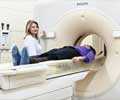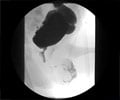Study says Iodinated and Gadolinium based contrast agents are associated with a very low rate of adverse reactions
A large cohort study published in the October issue of the American Journal of Roentgenology (AJR) says that iodinated and Gadolinium based contrast agents, frequently used during computed tomography (CT) and MRI scans to aid in the imaging process, are associated with a very low rate of adverse effects.
The study, performed at the Mayo Clinic in Rochester, MN, included a total of 456,930 contrast doses administered. "Only 522 cases of adverse effects were identified," said Christopher H. Hung, MD, lead author of the study. "The overwhelming majority of adverse effects were mild, represented with nausea and vomiting and mild rash. Only 16 cases necessitated transfer for further observation and treatment," he said."Contrast agents are very safe to use and they are often essential in aiding the diagnosis of CT and MR studies. As our study suggests, with the advent of newer contrast agents we have been able to improve their power-ability and safety profile," said Dr. Hunt.
"While contrast reactions can occur, it is important to note that they are rarely severe. Most of the reactions we saw in our study were mild and did not require treatment other than observation and supportive care," he said.
Source-Eurekalert
RAS









